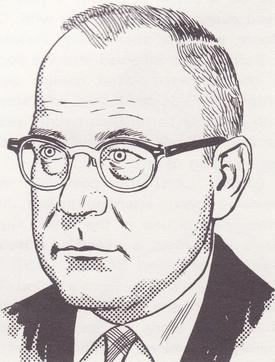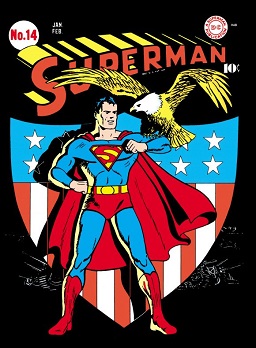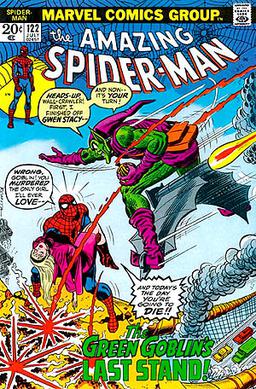
Gardner Francis Cooper Fox was an American writer known best for creating numerous comic book characters for DC Comics. He is estimated to have written more than 4,000 comics stories, including 1,500 for DC Comics. Fox was also a science fiction author and wrote many novels and short stories.

The Silver Age of Comic Books was a period of artistic advancement and widespread commercial success in mainstream American comic books, predominantly those featuring the superhero archetype. Following the Golden Age of Comic Books, the Silver Age is considered to cover the period from 1956 to 1970, and was succeeded by the Bronze Age.

The Golden Age of Comic Books describes an era in the history of American comic books from 1938 to 1956. During this time, modern comic books were first published and rapidly increased in popularity. The superhero archetype was created and many well-known characters were introduced, including Superman, Batman, Robin, Captain Marvel, Captain America, and Wonder Woman.
Golden Age refers to a mythological period of primeval human existence perceived as an ideal state when human beings were pure and free from suffering.

Julius "Julie" Schwartz was an American comic book editor, and a science fiction agent. He was born in The Bronx, New York. He is best known as a longtime editor at DC Comics, where at various times he was primary editor over the company's flagship superheroes, Superman and Batman.

An American comic book is a thin periodical originating in the United States, on average 32 pages, containing comics. While the form originated in 1933, American comic books first gained popularity after the 1938 publication of Action Comics, which included the debut of the superhero Superman. This was followed by a superhero boom that lasted until the end of World War II. After the war, while superheroes were marginalized, the comic book industry rapidly expanded and genres such as horror, crime, science fiction and romance became popular. The 1950s saw a gradual decline, due to a shift away from print media in the wake of television and the impact of the Comics Code Authority. The late 1950s and the 1960s saw a superhero revival and superheroes remained the dominant character archetype throughout the late 20th century into the 21st century.

Michael Dalton Allred is an American comic book artist and writer. He is most well known for his independent comics creation Madman and for co-creating and drawing the comic book series iZombie. His work often draws upon pop art, as well as commercial and comic art of the 1950s and 1960s.

Bulletman and Bulletgirl are fictional superheroes originally published by Fawcett Comics.
DC Archive Editions was a line of hardcovers which ran from 1989–2014, reprinting early, often rare comic book series, titles, and stories. They include more than 160 Golden Age and Silver Age comic properties currently owned by DC Comics, regardless of whether DC Comics was the original publisher. The series first published Superman Archives Vol. 1 in 1989. Most of the restoration work to make the pages suitable for quality printing has been done by Rick Keene, who has restored more than 2,500 pages.

Carmine Infantino was an American comics artist and editor, primarily for DC Comics, during the late 1950s and early 1960s period known as the Silver Age of Comic Books. Among his character creations are the Black Canary and the Silver Age version of DC superhero the Flash with writer Robert Kanigher, the stretching Elongated Man with John Broome, Barbara Gordon the second Batgirl with writer Gardner Fox, Deadman with writer Arnold Drake, and Christopher Chance, the second iteration of the Human Target with Len Wein.

The Bronze Age of Comic Books is an informal name for a period in the history of American superhero comic books, usually said to run from 1970 to 1985. It follows the Silver Age of Comic Books and is followed by the Modern Age of Comic Books.

Daredevil is a fictional superhero created by Jack Binder, who starred in comics from Lev Gleason Publications during the 1930s–1940s period historians and fans call the Golden Age of comic books before being retroactively established into the Image Universe by Image Comics in the 1990s as its first character. The character is unrelated to Marvel Comics' Daredevil, and recent renditions of the character have often renamed him Doubledare or The Death-Defying Devil to avoid confusion and potential lawsuits.
Showcase Presents was a line of black-and-white paperback books published by DC Comics at an average rate of two per month. Much like Marvel Comics' Essential Marvel volumes, each book usually included over 500 pages of reprints, primarily from the Silver Age. Like the Essential line, a Showcase Presents volume carried the suggested retail price of US$16.99 and was usually devoted to one character, "reprint[ing] all of their adventures in sequential order via cover date", or occasionally to a specific title rather than individual. The reprint line started in October 2005 with the releases of Showcase Presents: Green Lantern, Vol. 1 and Showcase Presents: Superman, Vol. 1, both offered at the lower introductory retail price of US$9.99.

George D. Klein was an American comic book artist and cartoonist whose career stretched from the 1930s and 1940s' Golden Age of comic books until his death in 1969. He was best known as an inker for DC Comics, where he was an integral part of the Superman family of titles from 1955 to 1968, and for Marvel Comics, where he was the generally recognized, uncredited inker on Jack Kirby's pencil art for the landmark comic book The Fantastic Four #1.
Bronze Age is an archaeological era, the second part of the three-age system for classifying and studying prehistoric societies.
Scarab, in comics, may refer to:
The history of American comics began in the 19th century in mass print media, in the era of sensationalist journalism, where newspaper comics served as further entertainment for mass readership. In the 20th century, comics became an autonomous art medium and an integral part of American culture.
Superman: The Complete Comic Strips 1939-1966 is an unofficial umbrella name for the six following titles: Superman: The Golden Age Dailies, Superman: The Golden Age Sundays; Superman: The Atomic Age Dailies, Superman: The Atomic Age Sundays; Superman: The Silver Age Dailies and Superman: The Silver Age Sundays, all published by The Library of American Comics. These six series of books collects the complete run of the American comic strip Superman by DC Comics, which was originally distributed in newspapers by the McClure Syndicate between 1939 and 1966.
Shining Knight is the name of multiple fictional superheroes appearing in American comic books published by DC Comics. The original version was created by Creig Flessel and first appeared in Adventure Comics #66.









